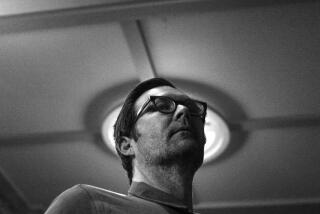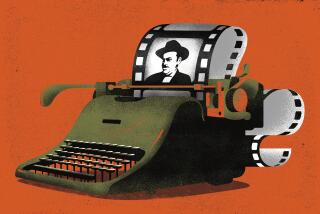Welles Does Justice to Kafka’s ‘Trial’
- Share via
The biggest knock that Orson Welles endured after the release of “The Trial” in 1963 was for his casting of Anthony Perkins as Joseph K., the lowly bureaucrat caught in a swirl of legal absurdities.
A lot of reviewers had firm ideas of what Joseph K., one of Kafka’s lasting literary victims, should be. Perkins, they said, was too nice-looking, too young, too tall, too this, too that.
Welles just snickered and said: “I think everybody has an idea of K. as some kind of little Woody Allen. That’s who they think he is. But it’s very clearly stated in the book that he is a young executive on his way up.” Welles said he wanted a Joseph K. that could project a certain “aggressiveness,” and Perkins was right.
He was on to something. As the focus of the nightmarish “The Trial” (screening Friday night as the latest installment in UC Irvine’s “Inside Outsiders” series), Perkins brings his customary twitchiness to the role, and it works in a weirdly energetic way.
His Joseph K. is the rat in the maze, but he’s constantly pushing against the walls, trying to figure things out, if not the way out. When his fate becomes clear, he’s resigned but defiant, neurotic but somehow clearheaded.
By giving Joseph K. a layer of awareness, Welles added a shading to Kafka’s existential novel that changes the impact a bit. The sense of victimization so pervasive in the book is lessened, but Welles compensated by raising the level of claustrophobia. The more Joseph K. struggles to find out why he’s been arrested, the more we feel all the doors closing around him.
They start shutting almost immediately. Joseph K. wakes early one morning to find a police inspector in his room, just watching him. He wants to know what’s going on, but every question is met with a vague reply or a question from the cop. Joseph K.’s desperation rises as the situation becomes more surreal. Other inspectors show up, implicating his neighbors as well as Joseph K.
He’s never told what the charges are, or what he can do to pull himself out of this problem. That sets him on an odyssey through a society apparently run by a secret network devoted to repression. Joseph K., abruptly thrown out of his usual routine and not knowing just how serious the threat is, bumps into one person after another, each confusing the situation a bit more.
Besides Perkins’ agitated performance, Welles draws good moves out of several actors in smaller roles. Jeanne Moreau projects her usual sexuality under a veneer of world-weariness, and Romy Schneider is magnetic as the eroticized secretary of Joseph K.’s lawyer, played enigmatically by Welles himself. Akim Tamiroff is oddly intriguing as one of the attorney’s clients who clings to the hope that he’ll be released from his own hell.
But “The Trial” is most remarkable when Welles and cinematographer E. Richard interpret Kafka’s work directly through the camera lens. The movie, shot mainly inside (some say because Welles couldn’t afford to film outdoors), has a submerged look invigorated by abstractions.
Welles always finds new ways to see a scene. One of the last, where Joseph K. runs through a cagelike hallway chased by feral girls, burrows into the eye and mind.
More to Read
Only good movies
Get the Indie Focus newsletter, Mark Olsen's weekly guide to the world of cinema.
You may occasionally receive promotional content from the Los Angeles Times.










